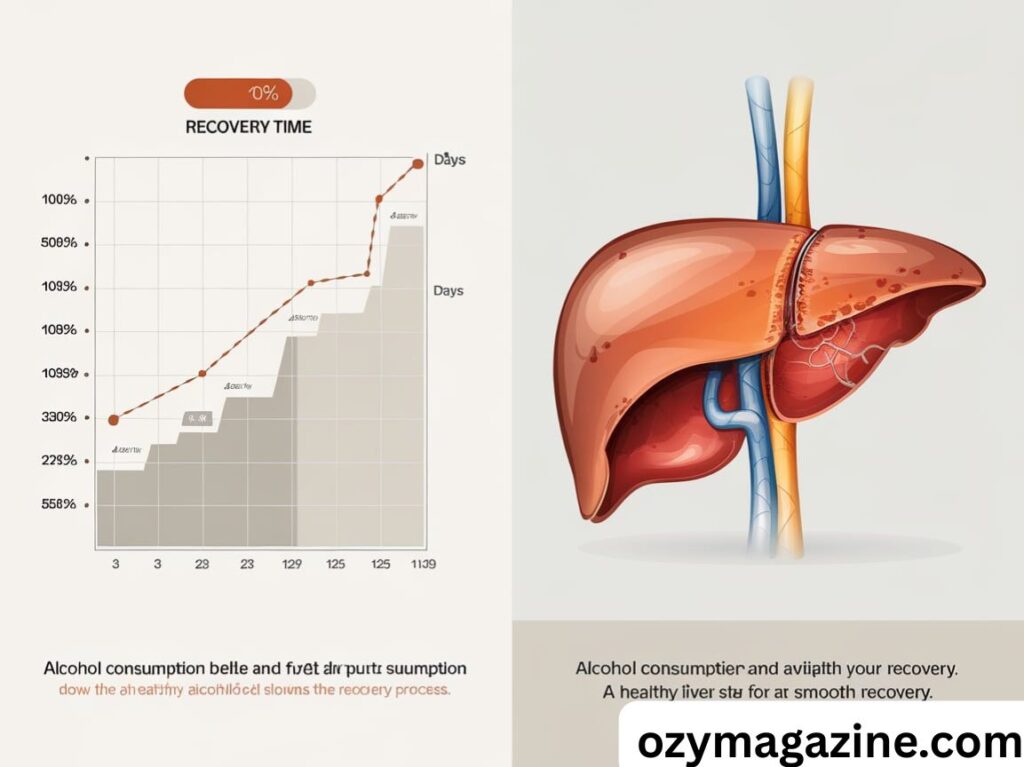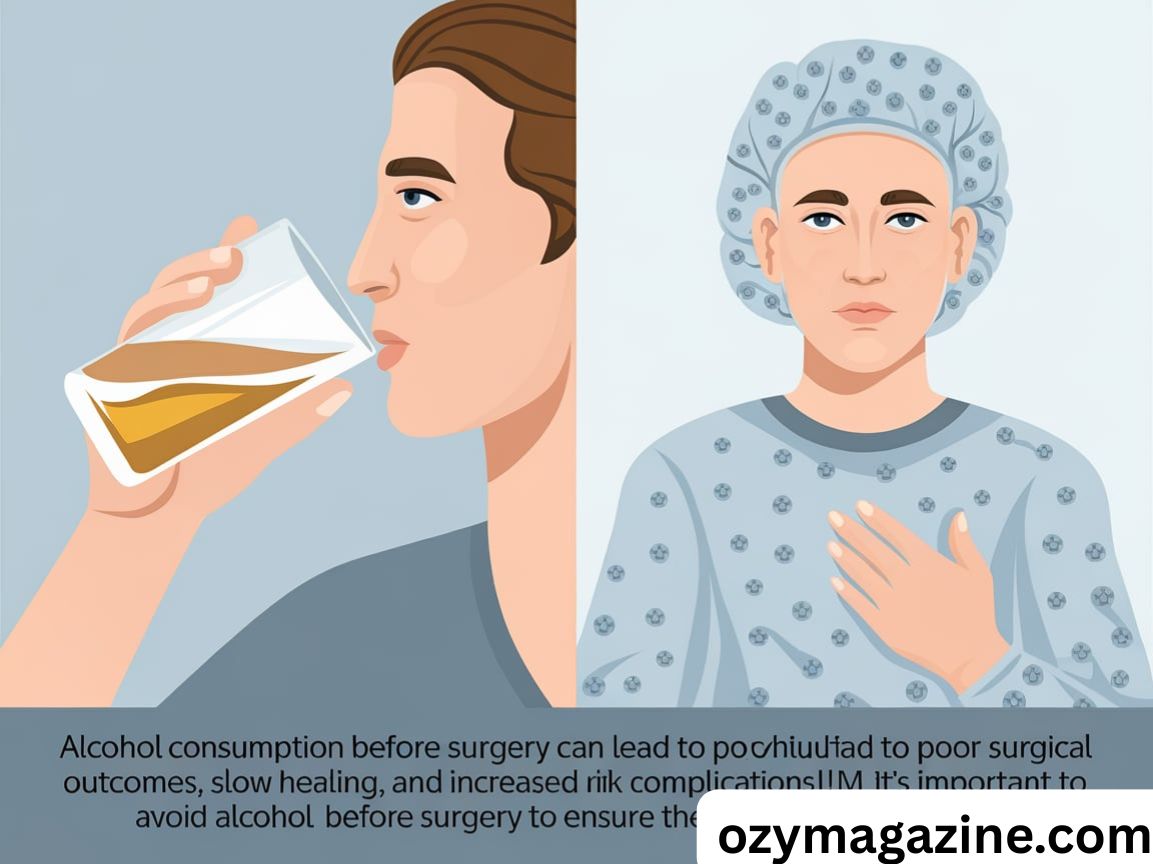Alcohol before surgery means drinking any kind of alcoholic drinks before you have an operation. It can affect how your body handles the surgery and the medicines used. Doctors often advise stopping alcohol some weeks before surgery for safety.
Drinking alcohol right before surgery might seem harmless, but it can cause serious problems. It can make bleeding worse and affect how anesthesia works. These risks can lead to longer hospital stays and slower healing.
Many people don’t know that alcohol weakens the immune system and slows down recovery. It can also make pain medicines less effective after surgery. Avoiding alcohol before surgery helps your body heal better and keeps you safer during the operation.
Key Takeaways
Avoiding alcohol well before surgery and during postoperative recovery can make a big difference. Patients who drink alcohol before surgery face greater bleeding risk, infection, and problems with anesthesia. Alcohol also slows wound healing and weakens the immune system, making it harder for your body to fight infections like sepsis. Most doctors recommend stopping alcohol at least two to four weeks before surgery. After surgery, it’s important to wait at least two weeks or longer before drinking again. Talking with your healthcare provider about the right timeline is key to a safe recovery.
Alcohol Before Surgery: Why Quitting Early Supports Recovery

Your body needs time to prepare for surgery, and quitting alcohol early helps it do just that. When you drink alcohol, it affects many important systems in your body. It can harm your liver function, which plays a big role in breaking down drugs used during surgery, including anesthesia. Alcohol can also weaken your immune response, making you more likely to get infections after surgery.
Studies have shown that even moderate alcohol consumption slows down the body’s ability to heal. Your collagen synthesis, which is how your body repairs tissues and heals wounds, is disrupted by alcohol. Without enough collagen, wounds take longer to close, and you could develop scars or infections. Quitting alcohol early means your body can focus on getting ready for the surgical stress and can heal better afterward.
The Risks of Drinking Alcohol Before Surgery
Drinking alcohol before surgery can bring many dangers. One major problem is the increased chance of excessive bleeding during the operation. Alcohol thins your blood, making it harder for it to clot when you get cut. This means your surgeon might struggle to control bleeding, which can make even simple surgeries risky.
Another issue is how alcohol interferes with anesthesia. Long-term drinking changes how your liver processes anesthesia drugs. You might need more medication, or the drugs might not work as expected, leading to breathing problems or delayed waking after surgery. Alcohol also delays stomach emptying, raising the risk of vomiting and pulmonary aspiration during anesthesia — a serious complication where stomach contents enter the lungs.
People who drink regularly before surgery are also more likely to have extended hospital stays due to postoperative infection prevention challenges and other complications. It’s important to stop drinking alcohol early to avoid these serious problems.
Interaction with Anesthesia
Alcohol and anesthesia complications go hand in hand. The liver’s ability to process anesthesia drugs can be severely impaired by alcohol use. This makes it difficult for doctors to get the right drug levels for your surgery. If the anesthesia dose is off, you might face breathing problems, confusion, or slower recovery from sedation.
Moreover, alcohol can slow your gastric emptying, meaning food and liquid stay in your stomach longer. This increases the risk of pulmonary aspiration, where vomit is inhaled into the lungs, causing severe pneumonia or even death. Being honest about your alcohol use allows your anesthesiologist to tailor anesthesia safely.
Increased Bleeding Risk
Alcohol’s effect on blood thinning is well-documented. This bleeding risk can be dangerous during surgery. Even small cuts could bleed more than usual, leading to complications like blood transfusions or emergency procedures to control bleeding. Certain surgeries, such as heart or brain surgery, have especially high risks from bleeding, making alcohol cessation even more critical.
Timing: When to Stop Drinking Alcohol Before Surgery
Doctors generally advise patients to stop drinking alcohol at least two to four weeks before surgery. This timeline gives your body time to clear alcohol from your system and improve liver and immune function. Even for light drinkers, avoiding alcohol for 48 hours before surgery helps reduce risks with anesthesia and bleeding.
For those with alcohol use disorder and surgery, quitting cold turkey without medical support can cause dangerous withdrawal symptoms. It’s important to seek help from doctors or support groups to safely stop drinking. Medical professionals can offer treatment plans, including medications for alcohol cessation and counseling to manage symptoms and prevent relapse.
The Impact of Drinking During Recovery

Alcohol doesn’t only cause problems before surgery—it can also slow healing and cause serious complications after surgery. Drinking during recovery can dehydrate your body, interfering with the body’s natural ability to heal wounds. Alcohol reduces the effectiveness of many medications and pain treatments, making recovery longer and more painful.
Your immune system is already busy fighting infections after surgery, and alcohol weakens it further. This makes you more vulnerable to surgical site infections and dangerous conditions like sepsis. Patients who drink during recovery often face longer hospital stays and higher chances of needing additional treatments.
Infection and Sepsis
One of the biggest dangers of alcohol during recovery is the increased risk of infections. Alcohol weakens your immune defenses, making it harder for your body to fight off bacteria and viruses. Even small infections around the surgical wound can turn into sepsis, a life-threatening condition. Sepsis causes widespread inflammation, organ failure, and can be fatal if not treated quickly.
Recognizing early symptoms like fever, confusion, and rapid heartbeat is vital. Avoiding alcohol helps maintain a strong immune response, reducing infection risks.
Slower Wound Healing
Alcohol slows the process of wound healing by disrupting blood flow and reducing hydration, which your skin and tissues need to repair themselves. It also interferes with collagen synthesis, the building block for new tissue. Without enough collagen, wounds stay open longer and may scar badly or get infected.
Alcohol causes inflammation and damages skin cells, further slowing healing. Patients who drink after surgery may find their wounds take weeks or months longer to heal compared to those who avoid alcohol.
Read Also : 300+ Happy Thursday Blessings, Greetings, and Prayers
Alcohol’s Effect on Medications and Pain Management
After surgery, many patients rely on medications for pain control and infection prevention. Alcohol can interfere with how these drugs work, often reducing their effectiveness or causing harmful side effects.
Medication Interference
Alcohol affects the metabolism of painkillers, antibiotics, and other medications. For example, mixing alcohol with opioids increases the risk of respiratory depression, a dangerous slowing of breathing that can be fatal. Other drugs may be broken down too quickly or too slowly because alcohol changes liver enzymes. This can lead to less pain relief or toxic buildup of medications.
Because of these interactions, doctors often have to adjust medication doses for patients who drink. The safest approach is to avoid alcohol entirely during recovery.
Managing Chronic Pain
Patients with a history of chronic alcohol use face extra challenges after surgery. Alcohol can change chronic pain thresholds, meaning they may feel more pain or respond differently to pain medications. This makes pain management more complicated and requires careful planning by healthcare providers.
Open communication about your drinking habits helps doctors create safe and effective pain treatment plans tailored to your needs.
Safe Timeline for Resuming Alcohol
Most medical professionals recommend waiting at least two weeks after surgery before drinking alcohol again. This time allows your body to heal, inflammation to reduce, and medications to clear your system. However, this timeline can vary based on the type of surgery, your overall health, and the medications you are taking.
Some patients may need to wait longer to avoid complications. Always talk to your surgeon or doctor before resuming alcohol to ensure your recovery stays on track.
Support
Stopping alcohol before surgery isn’t always easy, especially if you have been drinking heavily. Fortunately, there are many support options. Your primary care provider can help you create a plan for alcohol withdrawal management and may prescribe medications to ease symptoms.
Behavioral treatments, including counseling and therapy, teach coping skills to avoid relapse. Groups like Alcoholics Anonymous (AA) and online programs offer peer support, which many people find helpful. Family and friends also play a critical role in encouragement and assistance during your recovery.
There are special programs called perioperative alcohol cessation interventions designed specifically for patients preparing for surgery. These programs include education, support, and follow-up care to help patients quit drinking safely before surgery.
Why Avoiding Alcohol Before Surgery Leads to a Safer Recovery
Choosing to avoid alcohol before and after surgery is one of the most important decisions you can make for your health. Without alcohol, you reduce the risk of bleeding, lower the chance of dangerous infections, and improve your body’s ability to heal quickly. Your immune system stays stronger, medications work better, and your overall surgical recovery improves.
In the end, avoiding alcohol means fewer complications, less pain, and a faster return to your normal life. Always consult your healthcare provider to get personalized advice and support to make your surgery as safe and successful as possible.
Remember: Surgery is a major event for your body. Treat it with the care it deserves by avoiding alcohol before and after your procedure. Your future self will thank you.
Understanding How Alcohol Affects Your Body Before Surgery
Alcohol impacts many important systems in your body, especially when preparing for surgery. It weakens your immune system and slows down your body’s ability to heal wounds, making recovery more difficult. Drinking too close to surgery can also increase the risk of serious complications.
Your liver, which processes medications and anesthesia, can be damaged by alcohol. This damage affects how your body reacts to drugs used during surgery. Being alcohol-free before surgery helps your body work better and recover faster.
The Hidden Dangers of Drinking Alcohol During Recovery

Drinking alcohol while recovering from surgery can cause dehydration, which slows healing and increases inflammation. It also weakens your immune system, making it easier for infections to take hold. This can lead to longer hospital stays and more health problems.
Alcohol also interferes with pain medications and antibiotics, reducing their effectiveness. This means you might experience more pain and a higher risk of infection. Avoiding alcohol after surgery is crucial for a smooth, safe recovery.
Steps to Safely Stop Drinking Alcohol Before Surgery
Quitting alcohol before surgery can be challenging, especially for those with a history of heavy drinking. It’s important to seek support from healthcare professionals who can help manage withdrawal symptoms safely. Proper guidance makes the process smoother and less risky.
Many patients benefit from counseling, support groups, or medications designed to help with alcohol cessation. Planning your quit date at least two to four weeks before surgery gives your body time to heal and prepares you for a successful operation.
Conclusion
Avoiding alcohol consumption before and after surgery is essential for a safer and smoother recovery. Drinking alcohol can increase the bleeding risk, interfere with anesthesia, slow wound healing, and weaken your immune system, making you more vulnerable to infection and sepsis. These effects can lead to longer hospital stays and more surgical complications.
By stopping alcohol well before surgery and staying sober during the postoperative period, you give your body the best chance to heal properly. Always talk openly with your healthcare provider about your alcohol use so they can help manage medication interference, pain management, and guide you through a safe alcohol abstinence timeline before surgery. Taking these steps supports a stronger immune response and a faster return to good health.










